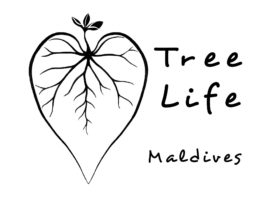Some flowers are adored for their beauty, intricacy, and some for their purposefulness. Humans use flowers in a variety of ways. Certain flowers are premium herbs, while others are natural dyes to color fabric, food, and edible flowers are used in cooking to arouse human senses.
Jasmine, sometimes spelled “jessamine”, in Maldivian lifestyle symbolizes communal harmony, simple life and pleasures of it. It is a gentle calming flower with a surprisingly intense aroma that holds ethereal meanings: eternal love, sensuality, purity, good luck. Interpretations of flowers change within cultures, some however are accepted universally as true impressions among cults, cultures and countries. Flowers and plants have evocative qualities with their ever-changing nature and brilliant color palette, they serve artists, poets, and writers as a natural form of inspiration.
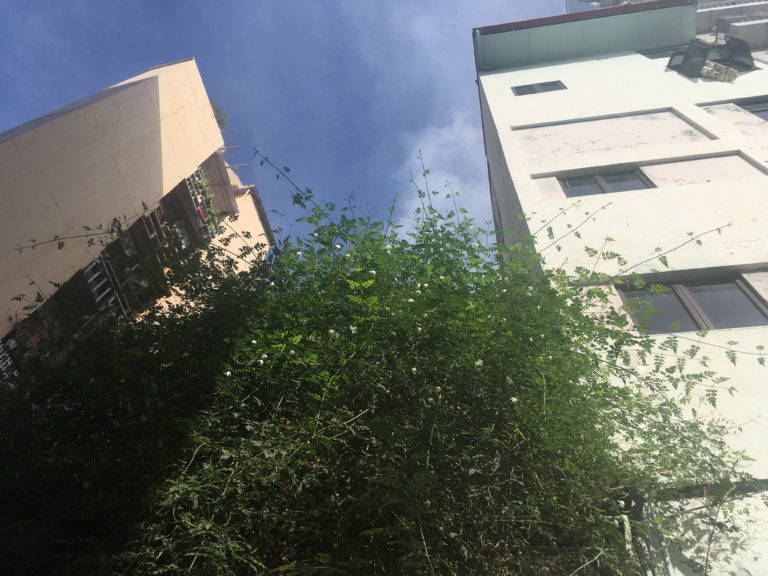
Jasminum consists more than 200 species that are distributed in tropical, subtropical and temperate parts of the world. Jasminum is a genus of climbing shrubs or vines of the family Oleaceae, among the members include; popular plants such as olive, ash, forsythia and lilacs. The word “jasmine” origins from the Persian word “yasmin” a name given to jasmine infused oil.
Few varieties are commonly grown in Maldives, namely;
Huvandhumaa
Guleynooranmaa
Irudheymaa
Kudhimaa
Malikubodumaa
Spanish jasmine
Stiff jasmine
Arabian jasmine
Angelwing jasmine
Star jasmine
Jasminum grandiflorum
Jasminum volubile
Jasminum sambac
Jasminum laurifolium
Jasminum multiflorum
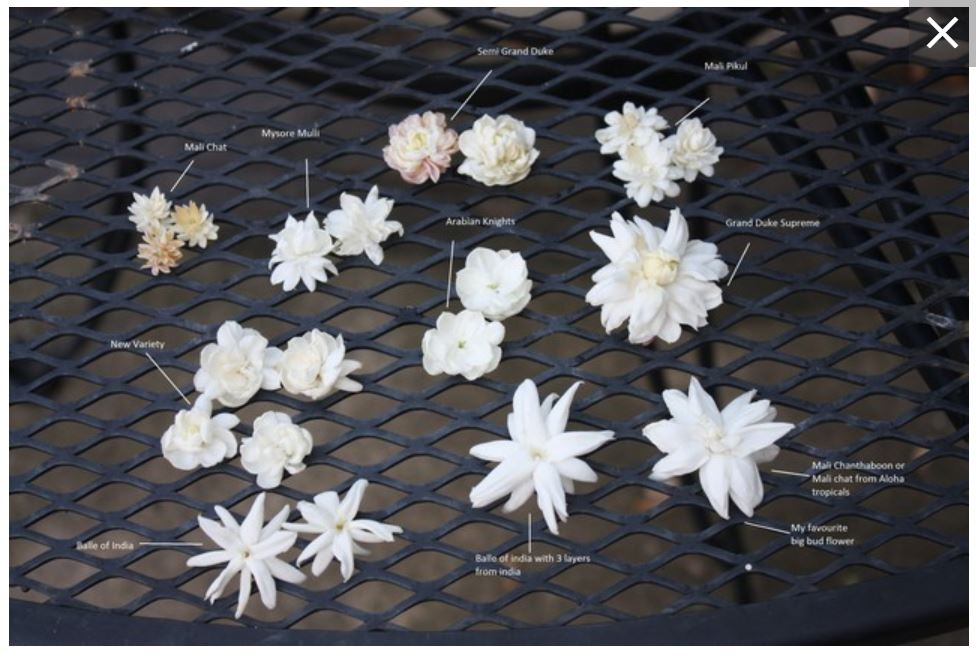
How and when, this tiny old fashioned flower-Huvandhuma was naturalized into Maldivian soil is unknown. Like many other culturally significant plants, it could have been brought in by ancient local navigators who sailed across the ocean to India, Ceylon, or Bangladesh. Taro was introduced to Fuvamulak from Bombay in such a way.
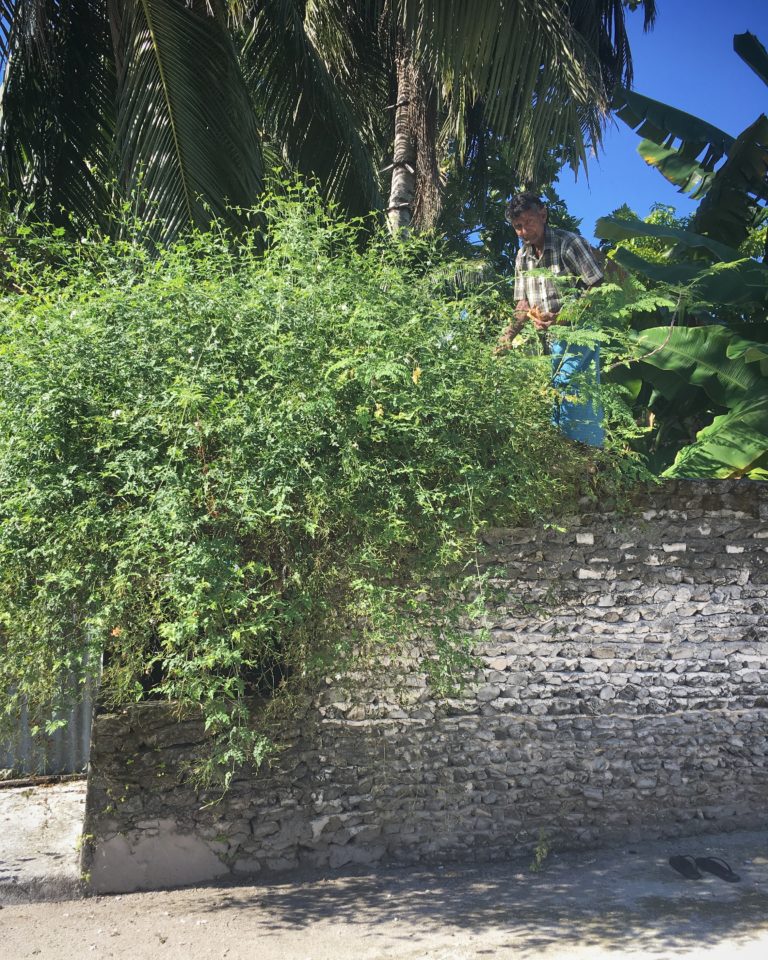
In Maldivian vernacular, plant names are hardly classified into families. Most plants have unique descriptive name with the suffix –ma(flower) at the end and an order of their own. Some introduced species are named in reference to the place of origin. The Spanish jasmine/Huvandhuma (Jasmine grandiflorum) is considered to be the most valued from the genus. It is a variation of Jasminum officinale, one along with Jasminum sambac that have high commercial value in the perfume industry and harvested in great quantities for the production of Jasmine oil.
Botanical bouquet of jasmine surrounds and flows in the air as it sets to bloom with the evening cool. Most jasmines are evening or night-blooming. This heavy sweet aroma is heady at first, unfolds into the night leaving a light floral scent that wanes with the morning sun. A spiritual aura surrounds the plant as the delicate jasmine flower surrenders to the impermanency of this life.
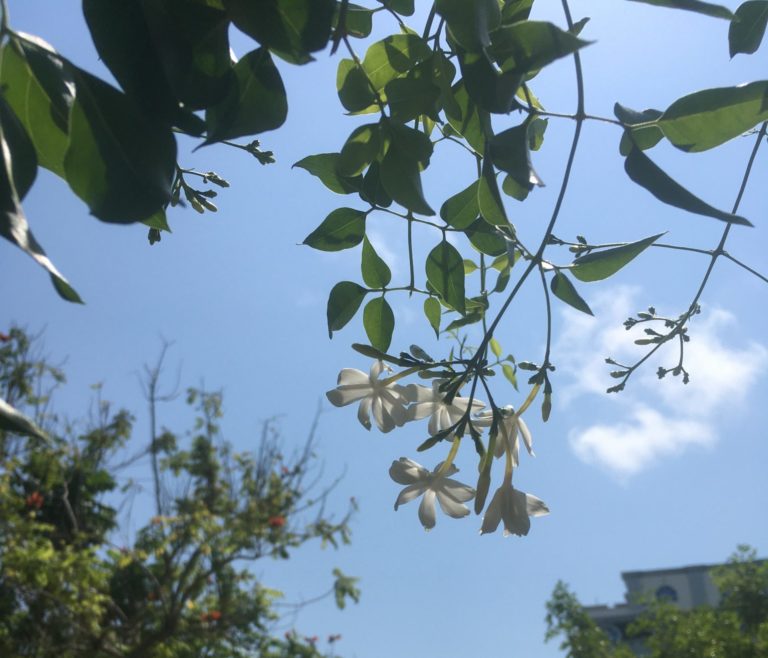
Jasminum grandiflorum (Huvandhuma) is grown in community spaces like the mosque, island office, schools, places where it is accessible to the community. Every island hosts a few Huvandhuma (Jasmine grandiflorum) plant in their mosque and without fail, every evening women (rarely men) gather around the bush. They search over tangling branches, picking delicate white buds forming on top of the leaves and branches. They share mundane life and its up and downs, taking time to smell the flowers, unawarely weaving the island web of life. When they have collected enough, the women walk side by side along paths lined with coconut palms, each hurrying home as the sun sets a golden hue in the background. This way of life is an intrinsic part of our island ethos. Gathering jasmine flowers is a cultural, religious, and regional tradition.
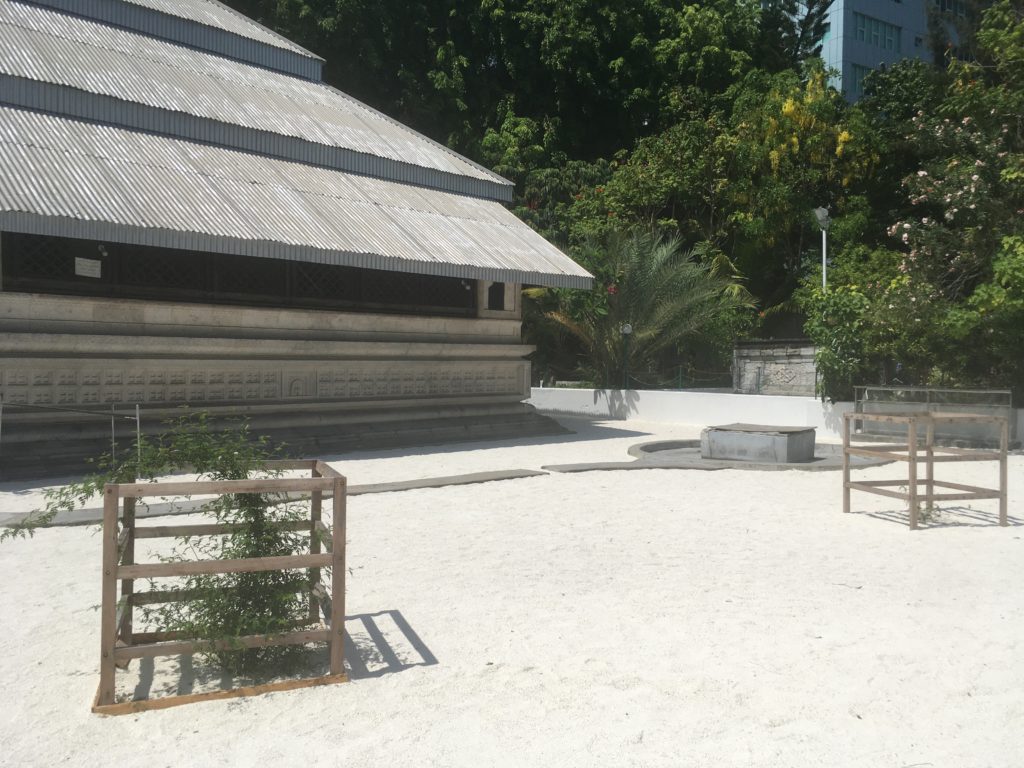
In India, the flower of Jasminum molle is held sacred to all forms of goddess Devi and is used as sacred offerings during Hindu religious ceremonies. Likewise in Buddhist traditions, flowers and garlands are part of temple rituals and offerings. In Islamic history, it is said that the prophet anointed his body with healing jasmine oil. The rituals connected to jasmine infused body oils and perfume (atharu) are preserved in Maldivian culture, perhaps it is one of the many practices influenced by Arabic culture.
Among the spiritual beliefs linked to jasmine, there is conviction in some parts of the Muslim world that jinn or genies (spiritual beings said to interact with the human world) are attracted to jasmine because of its potently erotic and intoxicating fragrance that envelopes the plant at night.
A night under the bush is unimaginable, full of unwelcome, unseen visitors. Maldivians are instilled from birth to never disturb the sleeping jinns. Most people keep away from plants and flowers after sun-down.
The treasured flower buds are carefully picked when they are half-opened, processed without delay so no aroma is wasted. In many local households, hand-picked flowers are neatly set afloat in a bowl of rainwater to make an infusion (jasmine flavored water) or put in sugar until the flower withers and the essence extracted to the sugar. These preparations are later used to flavor tea and other sweet dishes.
Stories are made, told, and amplified over freshly brewed cups of jasmine tea. It is a sweet tradition, mothers, fathers, grandparents, and children all agree to — a meal not to be missed. Hedhikaa (Fried and baked short-eats) cakes and biscuits are accompanied with Jasmine tea in a glass transparent teacup, this particular “food spread” has become the classical Dhivehi afternoon tea, served in teahouses, cafes, and restaurants since the 1960s.
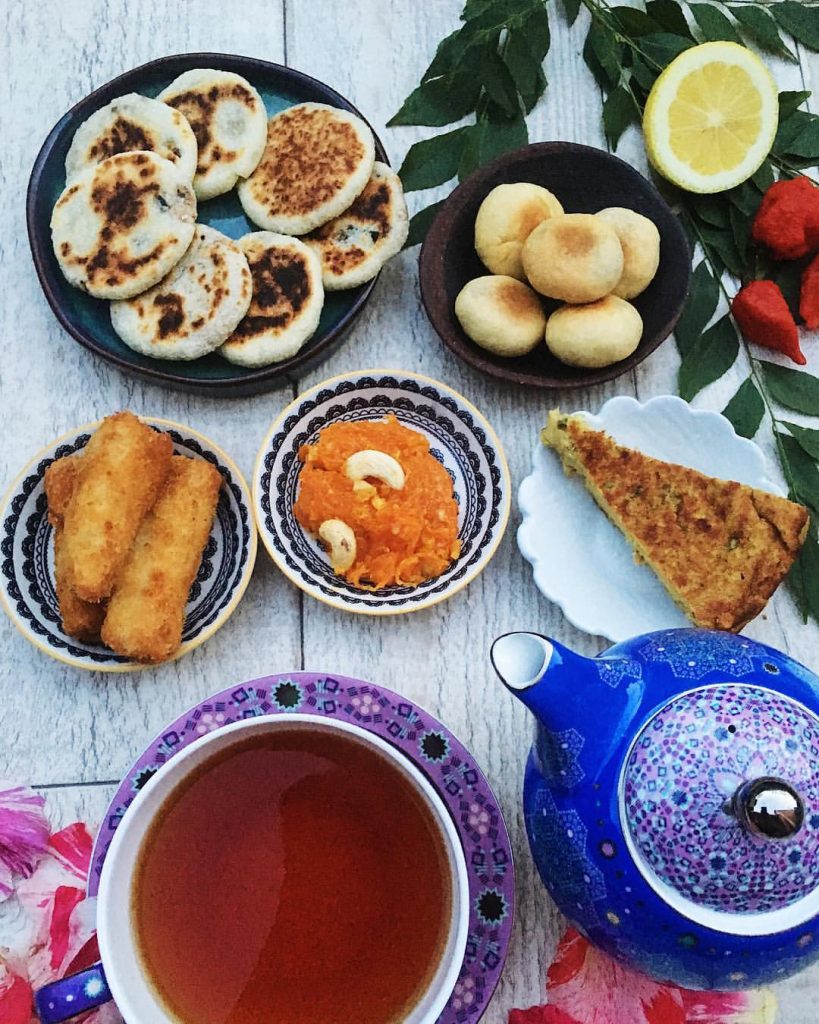
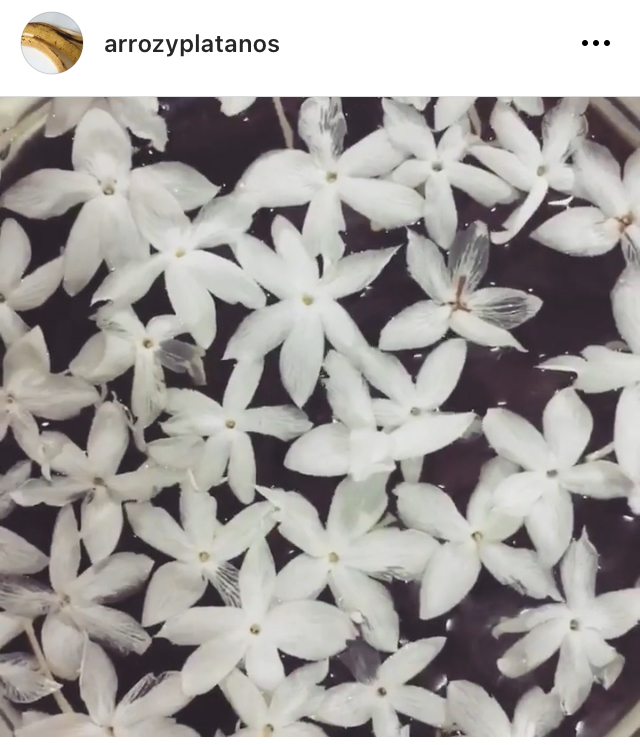
Without delicious fruits and scents of flowers, living on Earth will be drearily dull. Rising temperature and climate change are havocking Mother Earth’s balance. The evidence is overwhelming and the future of humanity and every living organism is in danger. Scientists at the Hebrew University of Jerusalem in Israel are linking climate change and the rising temperature of the Earth to, flowers losing their original fragrance. Without the scent of flowers, insects will have no nectar to feed on, as the insects die-off so will our food supply, and the lush beauty of it. The world will be drab.
Contrastingly, the sight of a healthy fully-grown, jasmine bush supported by trellises or twisted stems climbing to reach the sun is beautiful and ornate. The best feature is the dense foliage; speckled with pearl white clusters of blooms effusing lustful fragrances to any who traversed. Jasmine is a plant that grows throughout the year; the flowering pattern varies across species. They flower in clusters or solitarily. Jasmine can be grown for shade, cascaded over a roof or door entrances. It can easily be trained on trellises and grown in pots indoor.They grow best in bright indirect sunlight. A flourishing jasmine plant provides consistently when it is tended and cared for.
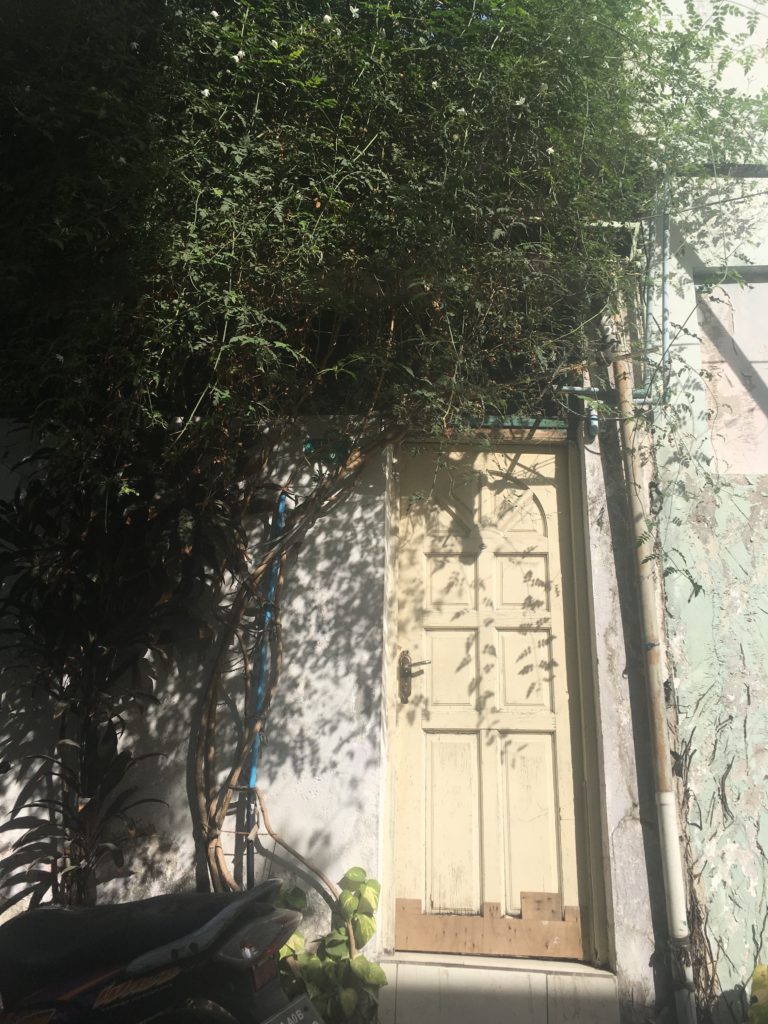
We give meaning to the unworldly redolence of jasmine by way of our people. My guess is that the perfume of Huvandhuma, for many Maldivians will refresh memories of grandparents, mothers, fathers, family, islands, and childhood. For me, as Huvandhuma exhales by unfurling its petals, when the volatile compounds that trailed through space hit my nose, thoughts of loved ones lost arises and impulse me to inhale a deep lungful of air, calming my every nerve.
Mahmoud Darwish, Poet from Palestine, writes of the Palestinian struggle.
The priestesses foretold what all beings foretold:You also will be what He is.
But we didn’t climb our fig tree
so the southern invaders could hang us on it.
Are we the skin of the earth?
We gnawed on stones to open a space for jasmine.
We took refuge in God from His guards, and from wars.
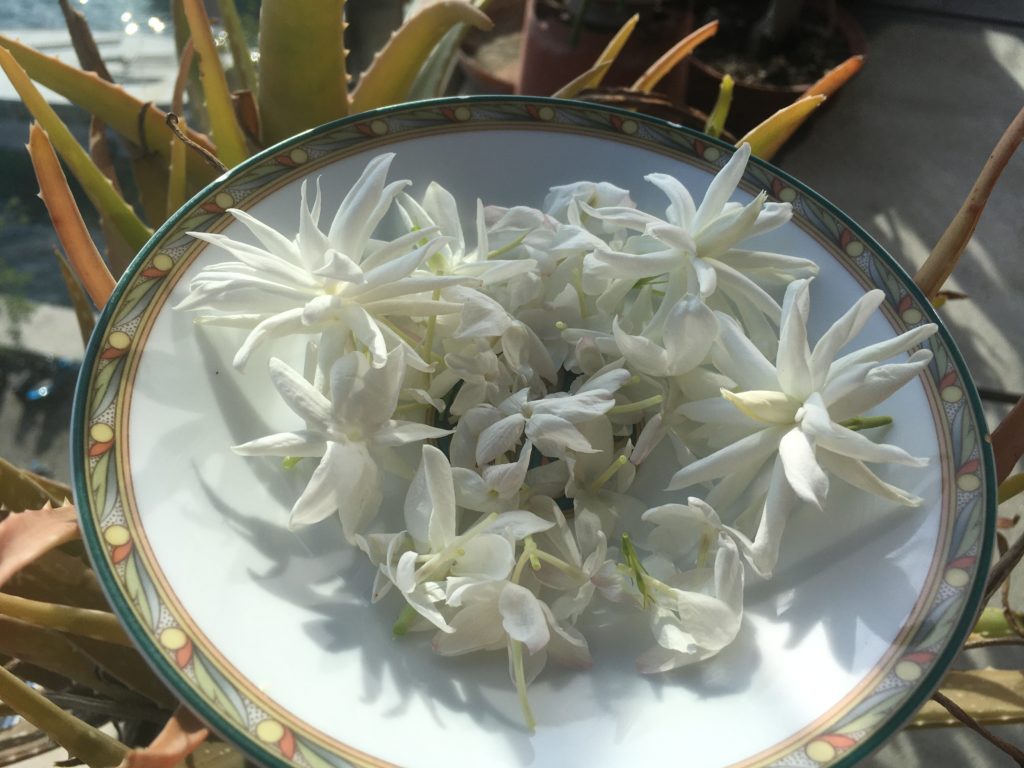
References.
Ornamental flower of Maldives catalogue.
A trail of jasmine – vilunu.com
https://en.wikipedia.org/wiki/Jasmine
The Symbolic Importance of Musk in Islamic Culture – Anya H. King
Contributions of Medieval Arab-Muslim Scientists to Botany and Agriculture-Rohma
Madurai and its Jasmine (A Celebration) – Madurai Malligai
Unfortunately, it was paradise, selected poems, Mahmoud Darwish.
Twitter: #Huvandhumaa #Guleynooranmaa
Instagram: #Huvandhumaa #Guleynooranmaa #Huvandhumaafen
